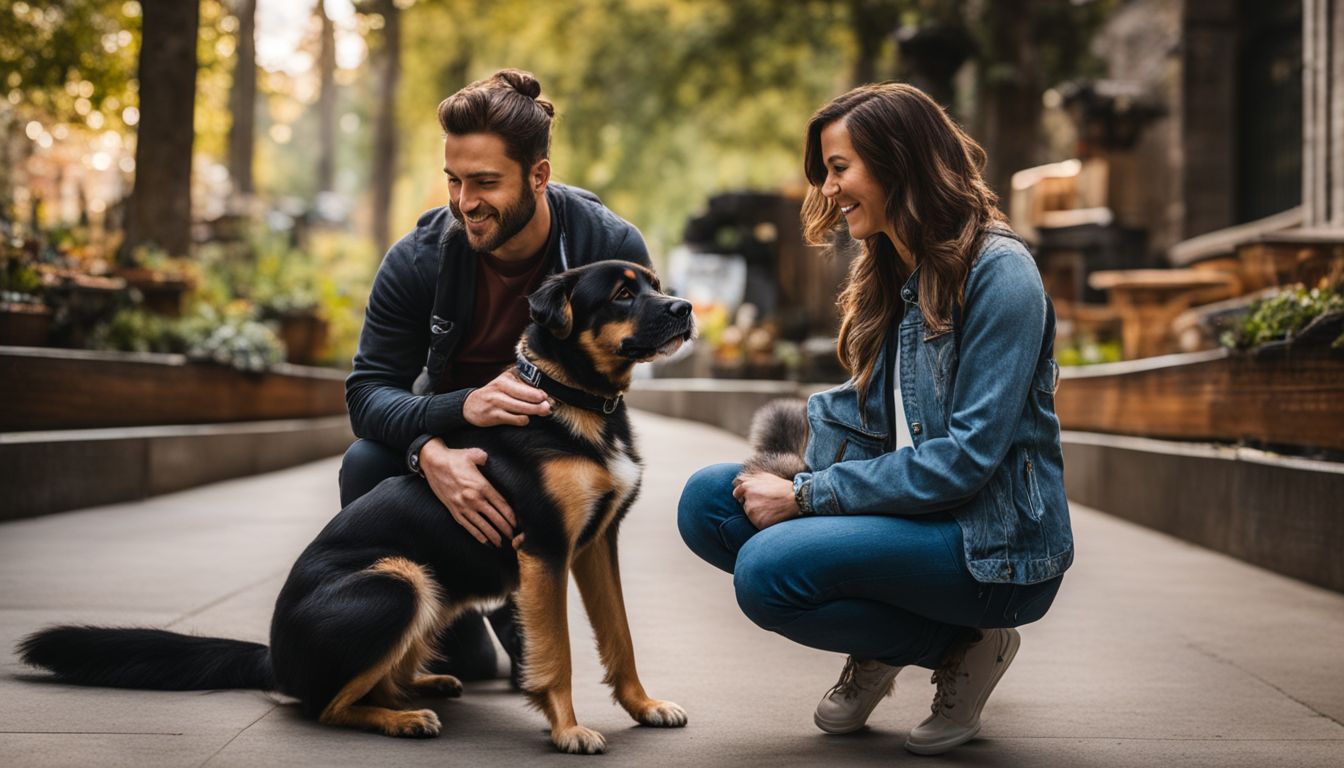Service Dogs for OCD: How They Help and Support
Living with Obsessive-Compulsive Disorder (OCD) can feel like a never-ending battle. Service dogs offer comfort and companionship in these tough times, reducing stress and anxiety for those affected.
This post explores how service animals, trained to support mental health conditions including OCD, can become valuable allies. Read on to discover more.
Understanding OCD and Common Treatments

OCD stands for obsessive-compulsive disorder. This mental health disorder makes people have unwanted thoughts, which we call obsessions. They also feel they must do certain things over and over, known as compulsions.
For example, someone might wash their hands many times to stop feeling anxious about germs. It’s not just a habit; it feels impossible to stop even if they want to.
Doctors often suggest talking therapies like cognitive-behavioural therapy (CBT) or medicines such as antidepressants to help with OCD. CBT helps by changing how a person thinks and acts towards their fears, reducing the need to carry out compulsions.
Therapy sessions can include exposure and response prevention therapy, where patients face their fears without giving in to rituals. While treatments vary from person to person, combining them with support from service dogs has shown promise in improving symptoms and overall well-being.
What are Psychiatric Service Dogs?

Psychiatric service dogs differ from emotional support dogs and bring various benefits to mental and physical well-being. They are trained to perform specific tasks that help individuals struggling with OCD.
Differences from emotional support dogs
Understanding the key differences between psychiatric service dogs and emotional support dogs is crucial, particularly for individuals living with OCD. Both play unique roles in supporting mental health, but their functions, rights, and training vary significantly.
| Aspect | Emotional Support Dogs | Psychiatric Service Dogs |
|---|---|---|
| Purpose | Provide comfort and companionship to help with emotional and mental health. | Perform specific tasks to help with disabilities, including OCD. |
| Training | No specific training for tasks related to disabilities. | Undergo extensive training to perform particular tasks that address the owner’s needs. |
| Legal Rights | Limited access to public places; not protected under the Americans with Disabilities Act (ADA). | Allowed in most public spaces; protected under the ADA. |
| Examples of Support | Provide general comfort through presence. | Interrupt compulsive behaviors, provide safety checks, or bring medication. |
Psychiatric service dogs offer a lifeline for those with severe OCD. They’re not just pets; they’re trained helpers that carry out tasks to improve their owner’s quality of life. On the other hand, emotional support dogs offer a sense of well-being through companionship. Each serves an important role, but psychiatric service dogs offer tangible support for tackling the challenges of OCD.
Benefits for mental and physical well-being
Service dogs do wonders for people with OCD. They bring friendship and comfort, making daily life less stressful. These clever animals can help their owners feel more at ease and safe.
This strong bond helps reduce feelings of anxiety and depression. Service dogs are not just pets; they’re trained helpers that stick by their owner’s side through hard times.
Having a service dog also encourages physical activity, which is good for the heart and mind. For someone living with OCD, going out can be tough due to fears or repetitive thoughts.
A service dog by their side gives them confidence to face the world outside. Plus, taking care of a dog means regular walks and playtime, leading to better fitness levels and a happier mood overall.
Specific tasks they can perform for OCD sufferers
Service dogs play a crucial role in assisting individuals with obsessive-compulsive disorder (OCD). They perform specific tasks customised to manage the condition, offering both emotional support and practical assistance.
- Interrupting repetitive behaviours: Dogs can be trained to spot when their owner starts engaging in compulsive behaviour like hand-washing or checking locks. They gently intervene by nudging, pawing, or bringing a toy to distract them.
- Preventing harmful actions: For those who harm themselves as a part of their condition, these dogs step in to stop the action. They might lick the owner’s hands or place their body between the individual and the object of harm.
- Reducing anxiety during panic attacks: During anxiety or panic attacks common in OCD sufferers, service animals offer physical comfort. They do this through deep pressure therapy, where lying on or against the person lowers stress levels.
- Ensuring routines are followed: Service animals can help owners maintain a healthy routine such as waking up at a certain time, which is essential for mental well-being. This regularity helps combat obsessive thoughts and intrusive ideas by focusing on structure.
- Providing reminders for medication: These dogs can remind their owners to take medication at specific times using various signals like barking softly or touching them with a nose.
- Enhancing social interactions: Individuals with OCD often struggle with social anxiety or fear of judgment from others due to their compulsions. Service dogs act as social bridges, easing conversations and interactions within public settings.
- Bringing items to cope with stress: In moments of high stress or when feeling overwhelmed by intrusive thoughts, service animals fetch items that aid in calming down their owner, such as stress balls or comforting textures.
- Guiding away from trigger environments: Assistance dogs quickly learn about environments that could exacerbate their owner’s OCD symptoms and guide them to safer places when they detect signs of distress.
- Offering companionship during loneliness: Finally, simply having a faithful companion offers immense mental health benefits including reducing feelings of shame and loneliness while increasing feelings of security and happiness.
Each task that service dogs perform is aimed at supporting individuals through both tough moments and daily challenges brought about by obsessive-compulsive disorder.
How to Get and Train an OCD Service Dog
To obtain and train an OCD service dog, determine your eligibility, select a suitable breed and training program, and integrate the dog into your treatment plan. For more details on this topic, continue reading the blog.
Qualifying for a service dog
To get a service dog for OCD, you must have a diagnosis from a mental health professional. This includes doctors like clinical psychologists who understand your condition deeply. They assess if a service dog will help your obsessive-compulsive disorder and write a letter to prove your need.
Training programs then match you with the right dog. Some people also work with animal assistance groups to find their perfect match. The process requires patience and commitment but leads to having a companion trained to support you through challenges related to OCD.
Choosing a breed and training program
Picking the right breed is key for anyone looking to get a service dog for OCD. Some breeds have natural qualities that make them great helpers, like being calm and focused. Labs, Golden Retrievers, and Poodles often top the list of best dogs for OCD.
They’re known for their gentle nature and ability to learn quickly, which is important in managing symptoms of this condition. A visit to an organisation like Assistance Dogs UK can provide valuable insights into which breeds might suit your needs best.
Training is just as crucial as choosing the breed. A well-trained service dog can perform tasks specific to helping with OCD, such as interrupting compulsive behaviours or providing comfort during high anxiety moments.
It’s not just about picking any training programme; it has to be one specialising in psychiatric service animals. These programmes teach dogs how to act in various situations specific to mental health issues including OCD, depression, and anxiety disorder.
They combine behaviour therapy techniques with specialised commands that address the unique challenges faced by individuals with obsessive-compulsive disorder.
Integrating your dog into your treatment plan
Making your service dog a part of your OCD treatment plan involves teamwork with mental health professionals. Talk to therapists or doctors about how best to include your dog in daily routines and therapy sessions.
Your dog can help with exposure-response prevention tasks, which are key in managing OCD symptoms. For instance, they can interrupt repetitive behaviors or provide calming support during high-anxiety situations.
Teach family members and friends how to interact with your service dog so they support your treatment goals. Use homework assignments from cognitive-behavioral therapy (CBT) sessions as opportunities for integrating the dog into recovery practices.
This could mean having the dog present when confronting triggers or practicing new coping strategies learnt in psychotherapy. By doing so, you create a supportive environment that enhances the effectiveness of both medical advice and emotional companionship provided by the service animal.
Conclusion
In conclusion, service dogs offer valuable support for individuals with OCD by providing companionship and assistance in managing their condition. These specially trained animals can help reduce stress, anxiety and provide emotional comfort to those struggling with OCD.
With their unique abilities and training, service dogs make a significant impact on the mental well-being of individuals living with obsessive-compulsive disorder. By integrating these loyal companions into their treatment plan, people with OCD can experience improved quality of life and a sense of security that helps them navigate daily challenges more effectively.
FAQs
1. What is a service dog for OCD?
A service dog for OCD is a trained animal that helps people with Obsessive Compulsive Disorder by offering support during anxiety attacks, helping stop ruminating thoughts, and interrupting avoidance behaviours.
2. How do service dogs help people with OCD?
These dogs are trained to notice when someone starts showing signs of distress or begins compulsive behaviours. They can distract them, provide comfort to reduce feelings of anxiety, or even bring medication in an emergency.
3. Can anyone with OCD get a service dog?
Yes, if you have been diagnosed with obsessive-compulsive disorder by medical professionals, you might be eligible for a service dog through certain programmes or rescue groups that specialise in training these animals.
4. Are there other types of support animals for mental health?
Besides service dogs, there are emotional support animals which offer comfort just by being present. They don’t have the same training as service dogs but can still help manage symptoms of mental illness like low mood or emotional distress.
5. What’s the difference between therapy dogs and service dogs for OCD?
Therapy dogs provide affection and comfort to many people in settings like hospitals or schools but aren’t assigned to one person and don’t have specific training for OCD tasks unlike personal service dogs trained to meet the needs of their handler’s condition.
6. How does having a service dog fit into overall treatment for OCD?
Service dogs complement traditional treatments like cognitive behaviour therapy by providing immediate relief from symptoms such as rumination and existential worries while also encouraging social interactions that can mitigate feelings of guilt or depression.

